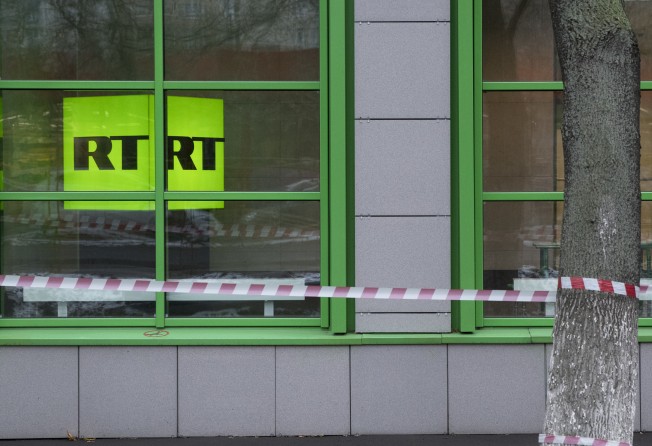Russian Justice Ministry has declared RFE/RL & VOA and several affiliated news services "foreign agents" https://t.co/5AHCvr50Cw pic.twitter.com/bURuaT53Gy
— RFE/RL (@RFERL) December 5, 2017
Russia tags Voice of America, Radio Free Europe, and seven news services as foreign agents
Move in retaliation for US action to declare Russian network RT a foreign agent

Russia on Tuesday named Voice of America, Radio Free Europe/Radio Liberty and seven affiliated news services as foreign agents, and the Russian parliament prepared to ban the organisations from attending its sessions.
The moves come as Moscow follows through on its promise to retaliate for similar US actions against the English-language Russian network RT, which Russian leaders characterise as an assault on freedom of the press.
On Tuesday, the Russian Ministry of Justice published a list of nine outlets, which includes Russian-language subsidiaries of Radio Free Europe/Radio Liberty that cover the Caucasus region of Russia, Crimea, Siberia, and two predominantly Muslim regions in central Russia, Tatarstan and Bashkortostan. The designation also includes Current Time TV, which is produced by Radio Free Europe/Radio Liberty, and Factograph, a website produced by Radio Liberty.
The ministry statement did not mention any specific restrictions on the media outlets. But the Russian State Duma, the lower house of parliament, planned on Wednesday to ban reporters from any US media declared as foreign agents, following a decision by the US Congress to ban RT last month.
“The Duma decision might be looked upon as censorship or infringement of the rights of American journalists here but we understand that we have to make such decisions because the Congress has made such a decision in regards to RT,” Duma deputy speaker Pyotr Tolstoy told The Washington Post on Monday.
On Tuesday, Sergei Popov, deputy head of the rules committee for Russia’s upper house, the Federation Council, said the body could also ban media designated foreign agents, the Interfax news agency reported.
The Justice Department required that RT, previously known as Russia Today, register as a foreign agent under a 1938 law because of its alleged role in interfering in US affairs and the 2016 presidential campaign by pushing the Kremlin’s agenda.
RT disputes that it is an agent of the Russian government, arguing that it offers alternatives to mainstream news coverage, and Russian leaders have vowed to respond in kind.
“We didn’t start this theatre of the absurd,” Maria Zakharova, a Russian Foreign Ministry spokeswoman, said Monday at a Duma hearing. “But we have to respond to it.”
Russia’s law on foreign agents, which in the past has been used on non-governmental organisations critical of the Kremlin, requires the organisations to label their publications as coming from a foreign agent. The Russian government recently designated a union of truckers protesting highway tolls as a foreign agent.
A bill extending that law to media organisations sailed through both houses before President Vladimir Putin signed it last month.
On Tuesday, Radio Free Europe/Radio Liberty quoted its president, Thomas Kent, as saying he had received no details about what the foreign agent designation will mean.
“Radio Free Europe/Radio Liberty is a journalism company engaged in professional news coverage of Russia and other countries,” Kent said. “We remain committed to accurate and comprehensive journalism.”
Voice of America and Radio Free Europe were created during the cold war to broadcast news to the closed societies of the Soviet Union and the communist countries in its orbit.
Russian leaders say that in the drama surrounding RT, they are the ones defending free speech.
“In defending democratic values, [Russian lawmakers] reserve the right to take symmetric measures in response to the decision to withdraw Russian journalists’ accreditation with US Congress,” a draft of the Duma’s resolution reads.
The document recommends that legislatures in Russian regions adopt similar bans against Voice of America, Radio Free Europe/Radio Liberty and their affiliates.
A Duma official, speaking on the condition on anonymity because he is not authorised to speak to reporters, said the Russian law regarding foreign agents would be applied only to US media that receive government funding.